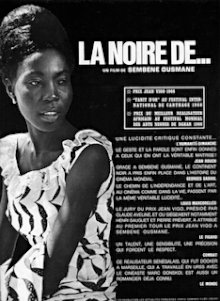Here’s yet another Senegalese film, an even earlier one that is apparently the first sub-Saharan African film to be internationally acclaimed. I didn’t like this very much as it’s just too simple and not very well made at all. None of the actors are very good and it’s infuriating to me that the main character Diouana has all these internal thoughts yet never voices any of them out loud. I get that this is really an allegory about colonialism but it’s so abstract and the ill treatment of Diouana by her employers so minor in the grand scheme of things that I found her reaction a shocking overreaction. I mean I get the point but this is all so removed from any real world situation that I found it impossible to get into it.
Diouana, a girl from Senegal, arrives in the south of France to take on a job as a live-in domestic servant. She expects her duties to be that of a nanny but finds the children absent. Instead she is disappointed to have to be the cleaner, the cook, and so on. Flashbacks show her life in a poor village outside Dakar, how she went everywhere in search of a job and lined up for ways on a street with other women to wait to be employed. She is overjoyed when the Madame hires her to take care of her children and offers her a traditional African mask as a gift. We also see scenes of her dating and walking with a boyfriend in Senegal. In France however she is miserable and feels alienated. When she wears her beautiful clothes to do her chores, the Madame reminds her that she is just a servant and should dress accordingly. When her employers host a gathering with friends, a guests comes up to Diouana, a guest comes up to her to kiss her on her cheeks just because he has never kissed a black girl before. The apartment becomes a prison for her and everyday she looks out the window at the scenery of the French Riviera without ever being able to visit it.
This is a difficult film to judge with modern eyes. We’ve seen so many horror stories of live-in maids being abused by their employers, being physically beaten, sexual assault, being starved and so on, that the ill treatment Diouana experiences here can’t help but seem mild in comparison. I understand the intent of director Ousmane Sembène however in wanting to show how it is inherently degrading for a human being to work for another as a servant and that the relationship between white Europeans and black Africans is only ever that of master and servant. Diouana wants and expects to be treated as an equal and to be able to live freely in France. There are other aspects that play into it, Diouana’s illiteracy and how this allows her employers to shape the narrative to fit their own views and needs, how being physically taken out of Senegal makes her feel out of place and so on, and how this also represents an indictment against capitalism in general. But the essence of it is that this isn’t a film about physical well-being. It’s about how colonization left behind a legacy that continues to wear on the spirit and identity of Africans long after the independence of their countries.
The messaging might have gone over better for me if the film was better made but it really isn’t. Mbissine Thérèse Diop is decent enough as Diouana but the two unknowns playing her employers aren’t convincing at all. The extensive use of a narrated inner voice instead of being expressed as dialogue between characters makes me think that this is the work of someone who is a writer first and a filmmaker second. It’s also possible that I’m missing something from the scenes set in Senegal. One scene has Diouana joyfully gallivanting above a monument only to be scolded by her boyfriend for being disrespectful. The plain reading of it is that Diouana is wrong to be happy about being able to live in France while trampling on her own country, making it an expression of nationalistic pride. Yet that would be such a facile interpretation that I don’t find it appealing at all. Is this really just a film with such a blunt message?
I think this is yet another film that has historical significance but what it wants to say as since been superseded by subsequent events and later representations of the life of a domestic servant. Sembène wants us to be horrified at how Diouana is treated but I think most migrants today would be perfectly content doing her job. He would of course respond that they should have more pride than to want to live like that but it’s just not the reality. Plus it was never a particularly well made film in the first place. I really wanted to like this film but in the end it didn’t work for me at all.
